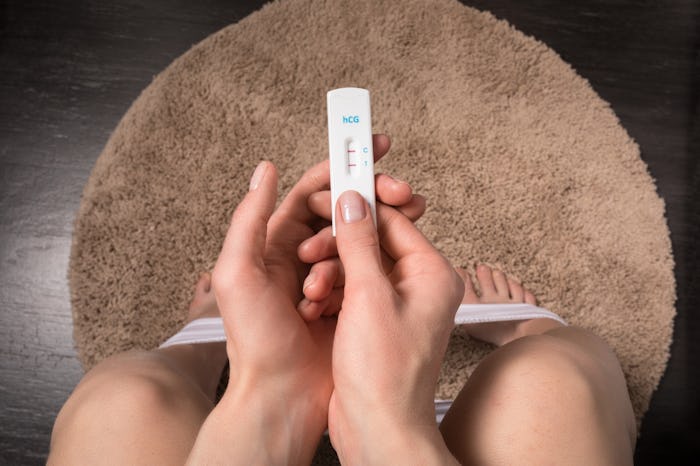Life

Can You Have A Period & Be Pregnant? It's Actually A Good Question
I'll admit, I've Googled questions about pregnancy and periods more times than I'd like to admit. Whether you're trying to get pregnant or trying to stay pregnant, or even if you're trying not to be pregnant, the question "Can you have a period and be pregnant?" is sure to cross your mind a time or two (at least, you know, in my experience). But no matter how many times you Google that question, the answer remains the same and it's an answer every woman (and man, actually) should know.
According to BabyCenter, you cannot have your period and be pregnant. It's a technical impossibility to have your period while you are gestating, because having your period is actually shedding the lining of your uterus. BabyCenter explains further, reporting that "each month, your uterus grows a thick blood-rich lining in preparation for an egg to embed there. If you don't get pregnant that month, you shed this tissue and blood." So if that lining sheds, which is you having your period, there's no pregnancy.
The tricky part, however, is that you can have vaginal bleeding that is not your monthly menstrual cycle while you are pregnant, and sometimes it's difficult to differentiate between the two. According to WebMD, about "20 percent of women experience bleeding during the first 12 weeks of pregnancy." Usually, if you experience bleeding in the first trimester, you're experiencing what's known as "implantation bleeding." WebMD explains further, reporting: "You may experience some normal spotting within the first six to 12 days after you conceive as the fertilized egg implants itself in the lining of the uterus." Of course, and always, it's important you consult with a physician if you experience any bleeding during any time in your pregnancy.
Bleeding later in pregnancy can indicate serious problems, though, and your doctor will want to address the bleeding and/or monitor you straight away. For instance, bleeding during later stages of pregnancy can indicate that you might have placenta previa, where the placenta is sitting between the baby and your cervix, or placental abruption, where your placenta is breaking away from the uterine wall, according to WebMD. Both of these conditions can be very dangerous and life-threatening to the mother and baby.
If you need to head to the doctor because of bleeding during pregnancy, there are a few things you should keep in mind. You'll want to use a pad to catch the blood, since your doctor might want to know how much you have been bleeding. Keep a note of what kind of bleeding you're having, too, including whether it is dark or light, heavy or light. You'll also need to keep any tissue that comes out with the blood so that your doctor can best assess the cause of the bleeding, as cited by WebMD.
Now, here's what you absolutely shouldn't do if you find yourself bleeding during pregnancy. Don't use a tampon, because tampons can increase the risk of infection during non-menstrual bleeding. Intercourse isn't a good idea either, according to WebMD, and at least until the bleeding has stopped and you've been cleared for sexual activity by your doctor. Introducing anything to your vagina isn't a good idea at this point because you can be introducing an infection that could you and your baby at risk.
If you've only just taken a positive pregnancy test and then start what seems like your period, you might have experienced what doctors call a chemical pregnancy. Chemical pregnancy accounts for 75 percent of early miscarriages, as reported by What To Expect, and many women don't know they are pregnant when they occur. What to Expect explains further, reporting the following:
"About three weeks after your last menstrual period, a fertilized egg implants in the uterus, and cells that would become the placenta begin to produce levels of the pregnancy hormone hCG that are high enough to detect on a blood or urine test. However, for some reason implantation never fully happens — and an ultrasound won't detect a gestational sac or placenta developing — resulting in bleeding around a week after your regular period was due."
This is another case that you'll want to call your doctor to check in.
Pregnancy is scary, and bleeding when you're pregnancy can be downright terrifying. As always, consult with a physician if you have any questions or have any cause for concern. After all, that's what they're there for.
Watch Romper's new video series, Romper's Doula Diaries:
Check out the entire Romper's Doula Diaries series and other videos on Facebook and the Bustle app across Apple TV, Roku, and Amazon Fire TV.